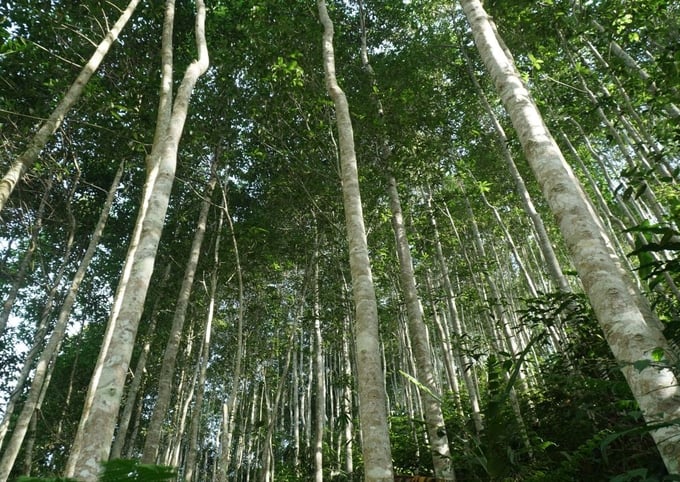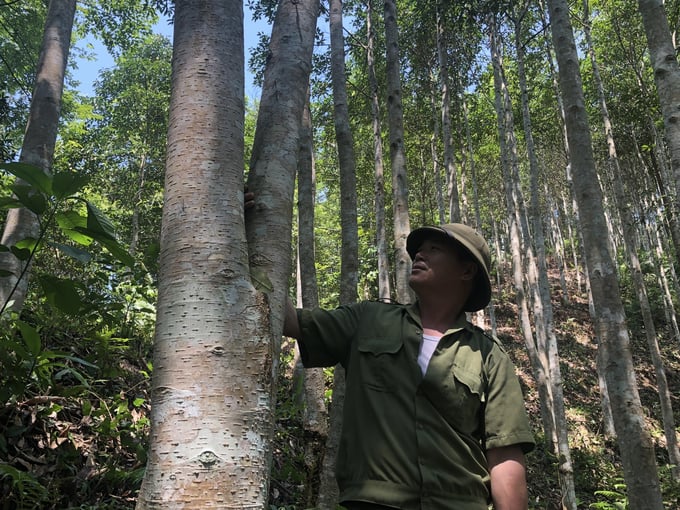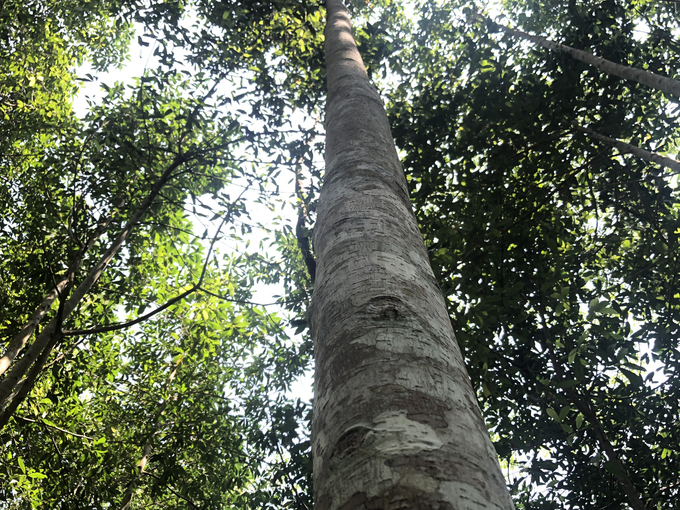November 19, 2025 | 02:48 GMT +7
November 19, 2025 | 02:48 GMT +7
Hotline: 0913.378.918
November 19, 2025 | 02:48 GMT +7
Hotline: 0913.378.918
Bac Kan Province currently boasts the highest forest coverage rate nationwide at over 73%. Forests have made significant contributions to the local economic and social development in recent years. However, the effectiveness of forest planting, harvesting, and wood processing activities in Bac Kan remains relatively limited compared to its potential.
Resolution No. 10-NQ/TU, issued by the Bac Kan Provincial Party Committee on April 22, 2021, set a target of planting 17,500 hectares of forest from 2021 to 2025, with an average of 3,500 hectares per year. The province has planted nearly 19,800 hectares of forest since the beginning of the committee's term, reaching 113% of the planned target. At present, Bac Kan houses approximately 100,000 hectares of planted forest. The province's current forest structure comprises nearly 49,000 hectares of magnolia trees, 37,000 hectares of acacia trees, 8,600 hectares of pine trees, 4,100 hectares of cinnamon trees, and 3,300 hectares of star anise trees.

According to calculations, large timber forest planting yields significantly higher returns compared to traditional short-cycle forest planting. Photo: Ngoc Tu.
A preliminary survey conducted by Bac Kan Province's Department of Agriculture and Rural Development indicates that acacia trees, with a business cycle spanning 5 to 7 years, generate an average revenue of 80 to 100 million VND per hectare. Magnolia trees, with a planting cycle spanning 10 to 12 years, generate an average revenue of 100 to 120 million VND per hectare. Cinnamon trees, with a business cycle spanning 10 to 15 years, generate an average revenue of 180 to 250 million VND per hectare. Star anise trees, with a planting cycle spanning 10 to 15 years, generate an average revenue of 200 to 250 million VND per hectare. Pine trees, with a planting cycle spanning 15 to 20 years, generate an average revenue of 160 to 220 million VND per hectare.
Ha Sy Huan, Director of Bac Kan Province's Department of Agriculture and Rural Development, noted that the current local practice of short-cycle forest planting and harvesting results in small tree diameters and limited economic returns. Director Huan emphasized the importance of FSC certification and large timber forests in enhancing the value of planted forests. The Provincial Party Committee’s Resolution No. 10-NQ/TU targets approximately 20,000 hectares of FSC-certified forest by the end of 2025, with 8,000 hectares currently meeting this standard.
"In addition, it is essential to plant large timber forests, as only large trees can significantly increase economic value. For example, magnolia trees are typically planted at a density of 2,500 trees per hectare. Without applying improvements from the large timber forest model, such as thinning and canopy management, the tree diameter is relatively small after a 15-year growth cycle. Magnolia trees with diameters ranging from 10 to 20 centimeters are priced at 1.6 million VND per cubic meter, whereas trees with diameters ranging from 20 to 30 centimeters are priced at 2.5 million VND per cubic meter. Trees with diameters ranging from 30 to 40 centimeters are priced at 3.2 million VND per cubic meter, and those with diameters reaching over 50 centimeters can fetch more than 4 million VND per cubic meter," Director Huan explained.

Planting FSC-certified and large timber forests, as well as promoting the deep processing of wood products are key solutions to enhance the value of planted forests in Bac Kan Province. Photo: Ngoc Tu.
Director Ha Sy Huan noted that farmers must practice thinning when cultivating magnolia trees. The first round of thinning should occur in the fifth year, which will reduce the planting density to nearly 1,000 trees per hectare. Subsequently, the second round of thinning should occur in the seventh year, further reducing the planting density to only 600 trees per hectare, and the final round of thinning should reduce the number to 400 trees per hectare. By strictly following this large timber forest planting process, farmers can enjoy considerable economic returns during the harvest season, with revenue totaling 500 million VND per hectare. Similarly, farmers can apply this method to acacia tree planting over a 12-year cycle to produce nearly 300 million VND per hectare.
"In addition, by adopting the large timber forest planting process, farmers can secure a regular stream of revenue, reduce labor costs, and avoid the additional expenses of purchasing seeds or fertilizers for replanting, compared to traditional methods," Director Huan added.
Bac Kan Province is currently implementing the KfW8 Project, spanning an area of 3,400 hectares. By participating in the project, local residents will receive training, guidance, and technical support for thinning practices, which have yielded promising initial results.

The large timber forest planting process help forest growers increase their income levels. Photo: Ngoc Tu.
The limited effectiveness of forest planting in Bac Kan can also be attributed to the lack of large-scale wood processing plants and deep processing facilities for products from planted forests. According to statistics, Bac Kan currently houses 243 wood processing and forestry product businesses. Among these businesses, 36 are companies, enterprises, or cooperatives, while the remaining 207 are private entities.
Local wood processing facilities are currently able to meet the needs of purchasing and processing wood from local forests. However, the number of large-scale processing facilities is limited, with small-scale operations and family-run businesses focused on basic processing, such as veneer, plywood, timber strips, and chopsticks.
Translated by Nguyen Hai Long

(VAN) Deputy Prime Minister Tran Hong Ha convened a meeting with the MAE and relevant agencies to discuss the draft decree on national multidimensional poverty standards for the 2026 - 2030 period.

(VAN) The year 2025 marks the 10th anniversary since more than 190 countries adopted the Paris Agreement on climate change, paving the way for strengthened global action.

(VAN) The PepsiCo Foundation funded the project ‘New Harvest: Sustainable Agriculture Initiative’, focusing on regenerative agriculture and climate change.

(VAN) Dr. Nguyen Viet Hung, ILRI's Regional Director for Asia, emphasized the One Health approach in ensuring food safety and reducing antimicrobial resistance risks in livestock.

(VAN) The youth-driven initiative ‘Innovate for water, act for the future’ seeks practical, scalable solutions to Vietnam’s water challenges.

(VAN) At the Annual Science Conference of Thuyloi University, Deputy Minister Phung Duc Tien directed researchers to focus on in-depth studies, data harmonization, and solutions linked to real-world practice.

(VAN) After nearly four years of implementation, 5,187 community agricultural extension groups have been established nationwide, with 47,493 members participating.